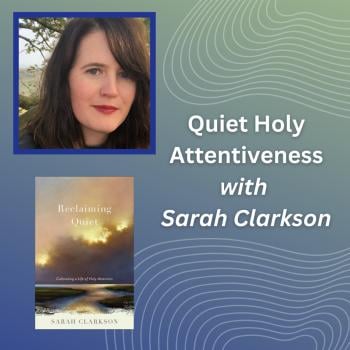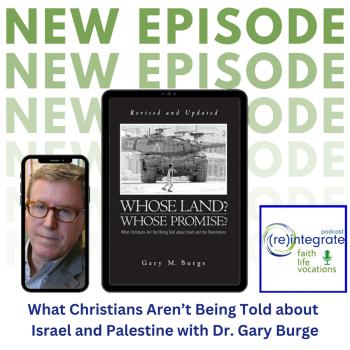Byron Borger, with his wife Beth, owns Hearts and Minds Bookstore, a Reintegrate partner. It’s time for his annual Favorite Book Awards! Out of the many books listed in the posts on his “Booknotes” blog, here are some that Reintegrate readers should know about. For Byron’s whole review of all the books he loves, go to the Hearts and Minds Booknotes page.
ALL BOOKS NAMED ARE ON SALE FOR 20% OFF at Hearts and Minds. You’ll find a secure order form link below.
BOOK OF THE YEAR
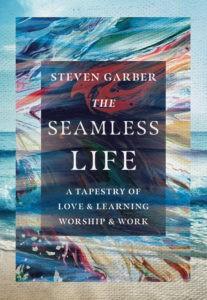 The Seamless Life: A Tapestry of Love & Learning, Worship & Work by Steven Garber (IVP) $20.00
The Seamless Life: A Tapestry of Love & Learning, Worship & Work by Steven Garber (IVP) $20.00
It is hard to declare decisively what my one favorite book was this year, but Garber’s A Seamless Life is up there, certainly among the top few. The smallish, compact size and the textured paper and the vivid color photos make me glad, the exquisite writing and the honest, sensible, yet radically integrated faith captures so much of my own heart. As I said in my big review HERE (please visit and read my comments if you haven’t) these chapters in A Seamless Life are reports from the road, insights into Steve’s life and teaching and travels and observations written out from along the way. He brings so much good context to his stories (whether it is a reflection on his rancher grandfather or a film review or a story from his beloved Pittsburgh or a telling about a workplace he visited where healthy, faithful efforts were being made for the common good.) He finds much to celebrate, even as his heart is heavy with the brokenness of the world. There is a coherence to all of this, really, a seamlessness that the reader is drawn in to as these short essays gel into a big picture of a life well lived.
REINTEGRATE FAITH WITH WORK
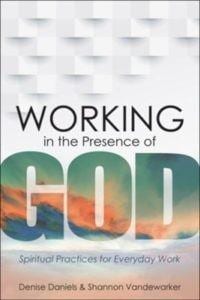 Working in the Presence of God: Spiritual Practices for Everyday Work by Denise Daniels & Shannon Vandewarker (Hendrickson) $24.95
Working in the Presence of God: Spiritual Practices for Everyday Work by Denise Daniels & Shannon Vandewarker (Hendrickson) $24.95
In this field, although there have been other very good books, this one is such a standout, I must name it as a clear award winner. In our large selection of books in this field (some old, some fairly recent, and some quite new) Working in the Presence of God brings some very, very good contributions and even correctives. This book offers a framework and starting foundation point about work that is essential, excellently explained, and rock-solid. Daniels and Vanderwarker have done the primary source reading and can articulate the best Biblical and theological foundational truths and cite the very best books and leaders for their project. Also, the authors actually strive to help us “practice the presence of God” in our modern workplaces, which is an audacious goal and a much-needed assist to those of us who talk about finding God in the science lab, the classroom, the shop floor, the lawyer’s office, the marketplace, the arts studio, or sports field.
CHRISTIAN LIVING / PERSONAL GROWTH
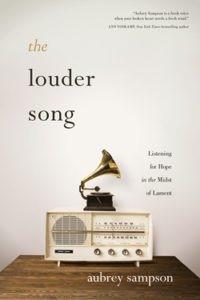 The Louder Song: Listening for Hope in the Midst of Lament by Aubrey Sampson (NavPress) $15.99
The Louder Song: Listening for Hope in the Midst of Lament by Aubrey Sampson (NavPress) $15.99
The Louder Song by Aubrey Sampson is very well written and exceptionally thoughtful. I will admit, there are oodles of spiritual books that tell of the great suffering people have gone through. I have an allergy to books that offer clichés, though, or answers that sound too easy. Some of these sorts of books about making sense of suffering tend that way and we avoid recommending them. And so, I’ll admit, when I read the long list of tragedies that befell this young woman — herself struck with a painful, chronic illness — I feared it would just be another rather sentimental story of God’s love for her through it all, fine but not terribly substantive. But, my-oh-my, is this a strong, thoughtful, gripping book. Yes, Aubrey Sampson has suffered more than most, and yes, she tells about her grief and loss and struggle and pain. But this is also an apologetic for and study of lament, one of the few very good, accessible books on this topic. In The Louder Song she explores what it is like to have exploding grief and to be able to cry out; how, indeed, God uses lament to lead us between (as she puts it) “The Already and Not Yet.”
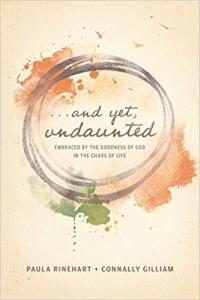 …And Yet, Undaunted: Embraced by the Goodness of God in the Chaos of Life by Paula Rinehart & Connally Gilliam (NavPress) $15.99.
…And Yet, Undaunted: Embraced by the Goodness of God in the Chaos of Life by Paula Rinehart & Connally Gilliam (NavPress) $15.99.
This was one of my favorite books this year in part because of the fine wisdom and down to Earth sisterly sort of advice these women offer. Paula Rinehart has been speaking and writing on woman’s issues for decades and we have stocked other books of hers over the years. Connally Gilliam is younger and also works in outreach and disciple-making with the para-church group, The Navigators. This book is fabulous; very smart, engaging, helpful. But the biggest reason I was so taken with this, why we promote it and think it is so very unique and worthy of our Best of accolades is because of the structure. Creation / Fall / Redemption / Restoration is the large theme of our Jubilee conference out in Pittsburgh that each February invites college students to “live a better story” by entering into that cosmic drama. Rinehart and Gilliam tell that story in the four units of their book. They allow the big picture of God’s Biblical drama to inform how we understand our daily lives, our personal hurts and fears, and how to learn to trust not just that God is good, but that God is up to something good: the fulfillment of His promises to renew and restore the cosmos. Our daily lives find health and hope by placing ourselves between the creation and the new creation, the garden and the city.
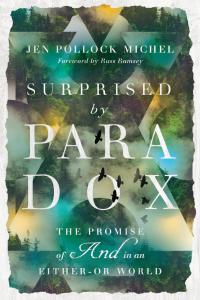 Surprised by Paradox: The Promise of AND in an Either-Or World by Jen Polllock Michel (IVP) $16.00.
Surprised by Paradox: The Promise of AND in an Either-Or World by Jen Polllock Michel (IVP) $16.00.
This is a great, great, artfully rich and beautiful book. I knew it would be because this author’s two previous books Teach us To Want and Keeping Place are among the best books of the last few years. She’s a great writer, a born storyteller, and a fine thinker. As one reviewer warned, “Don’t confuse this as a call for the mushy middle…” As Russ Ramsey (himself a thoughtful pastor and great wordsmith and author) says in the foreword, “Studied rightly, theology should lead to awe and wonder. To that end, my friend Jen Pollock Michel has given us a gift.” On the back of Surprised by Paradox we have rave reviews by Karen Swallow Prior, Emily Freeman, Tish Harrison Warren, and Marlena Graves. That’s enough to warrant an award right there! The mysteries and paradoxes Michel explores in upbeat and nicely crafted chapters are Incarnation, Kingdom, Grace, and Lament. This isn’t exactly the creation-fall-redemption-restoration meta-narrative that so nicely shapes And Yet Undaunted but it is close. There is good stuff in here about wonder and goodness; there is hard stuff about brokenness and injustice; her insights about the Kingdom include good ruminations on this already/not yet mystery (and well as the upside down “blessed are” passages of Jesus. And so, this book, too, offers what we might think of as a guide to basic Christian living, an ordinary sort of spirituality book that helps us with common stuff of faith and life. But yet, it is such a cut above the typical—graciously written, wisely construed, profoundly approached, with great questions for reflection and discussion that are really good.
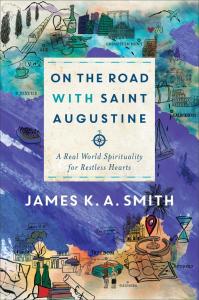 On the Road with Saint Augustine: A Real-World Spirituality for Restless Hearts by James K.A. Smith (Brazos Press) $24.99
On the Road with Saint Augustine: A Real-World Spirituality for Restless Hearts by James K.A. Smith (Brazos Press) $24.99
Augustine, before his famous conversion, found himself in a no-place, but moving on, heading to various cities and jobs and hopes and dreams in Italy. He becomes, in Smith’s amazing prose and incredibly insightful observations and analysis, like a 21st century social entrepreneur, an artist, a world-changer and culture maker, all the stuff so many energetic young adults today are yearning to become. But in the midst of that, the questions arise, Can we truly find and sustain a lasting identity in these grandiose schemes? Will we not always be restless tying this and that? Will we ever learn to live well, be wise, grow up? I cried for myself as an old guy, and for my grown kids, and for my friend’s adult kids, and for Jamie’s kids as he wrote with such empathy about what it is like coming of age in this secular age, in these confusing times. And I rejoiced in how he used the life and teaching of this memorable church leader from centuries ago to illuminate our calling to be in friendship, to relate to mothers and fathers, to find work, to learn to protest, to be an intentional character in our own (and God’s) story. He has a chapter on freedom, a chapter on ambition, a chapter on sex. My, my, how he turns this “refugee spirituality” of Augustine into a contemporary guide on the quest to (truly) find yourself.
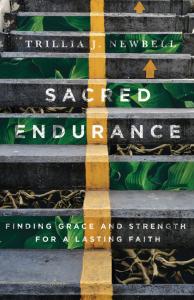 Sacred Endurance: Finding Grace and Strength for a Lasting Faith by Trillia J. Newbell (IVP) $16.00.
Sacred Endurance: Finding Grace and Strength for a Lasting Faith by Trillia J. Newbell (IVP) $16.00.
We hope you know Ms. Newbell as a great children’s writer. Her book about multi-ethnic reconciliation in the context of God’s faithfulness to the redemption of the creation, God’s Very Good Idea, is such a favorite because it helps children (and parents) to appreciate the “creation-fall-redemption-restoration” four chapter gospel that we talked about above, and it is passionate about diversity and multi-ethnic ministry from a gospel-centered perspective. And so, when she did a book on endurance—on keeping on keeping on, or running the race as the Apostle Paul puts it—I was interested. But I wasn’t sure this was going to be extraordinary. There are lots of books about hanging in there. I was glad to find that Ms. Newbell offers so much insight by framing this question so wholistically that it stands not only as a good example of faithful Christian guidance on the topic (endurance) but as an example of how to do a thoughtful, substantive, faithful sort of Christian self-help book. She offers great advice about turning to Jesus and being faithful, trusting in God. But she offers this advice in ways that are framed by the bigger story of God using suffering and God redeeming the ordinariness of our days. She covers content that some basic “Christian Living” books miss. For instance, she has a chapter about the role of the mind, and she talks about enduring in society. (Yes, questions of race and racism are part of basic Christian living!) She calls us to do life with others in community, and insists that we can be faithful “without denying or downplaying the reality of suffering and evil we face in this life.”
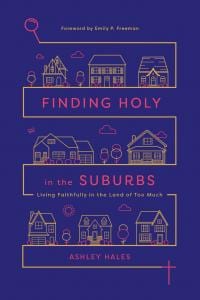 Finding Holy in the Suburbs: Living Faithfully in the Land of Too Much by Ashley Hales (IVP) $16.00
Finding Holy in the Suburbs: Living Faithfully in the Land of Too Much by Ashley Hales (IVP) $16.00
I almost listed this in the last post in our category of spiritual formation; it is indeed about the shape of our faith, the call to holiness, the formation of our discipleship. But the great contribution of this book is found in the insights this author has about the concrete details of our built environment and the habits and customs (and values and dispositions) that flow from them. Hales isn’t a literary critic or professional analyst; she strikes me more as a soccer mom. That is, she is fairly ordinary, a smart suburbanite who is astute enough to realize that studying the mores of one’s place and the habitats thereof really is an important prophetic task. To “understand the times and know what God’s people should do” (from 1 Chronicles 12:32) isn’t just a call to a big-picture sense of the zeitgeist, but, also, a study of the daily details beneath our feet.
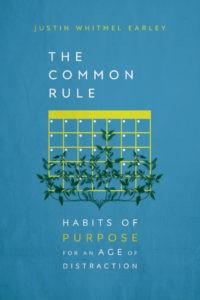 The Common Rule: Habits of Purpose for an Age of Distraction by Justin Whitmel Earley (IVP) $18.00
The Common Rule: Habits of Purpose for an Age of Distraction by Justin Whitmel Earley (IVP) $18.00
How can we live into a balanced and thoughtful way of life that makes sense of things, helps us say yes and say no to stuff, live well with such a grand quest for margin and balance turning into a shtick or formula? Taking the old Benedictine rule of life notion into a 21st century, on-line world, Earley started thinking of helpful ways his community could help each other be what they most deeply wanted, by entering more fully into a communal practice of discerning life-giving habits. He’s been influenced by the notions of “cultural liturgies” as found in Jame K.A. Smith and “finding God in the ordinary” (a la Tish Warren.) He’s thought well, experimented faithfully and consciously, and is a good writer, reporting back what he has learned. In so doing he has written what I think is one of the best books in this genre in many a year; it is interesting, based on serious cultural and theological considerations, but really, really practical. It will help you find focus and balance and health.
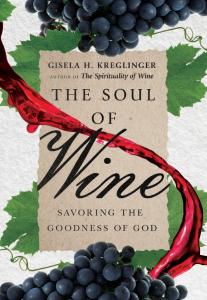 The Soul of Wine: Savoring the Goodness of God by Gisela H. Kreglinger (IVP) $16.00
The Soul of Wine: Savoring the Goodness of God by Gisela H. Kreglinger (IVP) $16.00
I’m not sure when I first read the poem “As Once The Winged Energy Of Delight” by Rainier Maria Rilke The Bible teaches a sturdy and robust doctrine of creation, We are made in the image of a creator God and God places Adam and Eve in the garden. It is our culture-making vocation and task (to use Andy Crouch’s phrase from his book Culture Making) to make something of the raw stuff of creation. We “exercise dominion” by stewarding well the potential and possibilities of the wonderful stuff God has graciously put into the creation. We are to cultivate—eggs into omelets, so to speak—and make something for the common good. It is the theological accounting for art and science, families and schools, businesses and governments, parties and rituals, policies and programs. And wine. How glad I am for this book which helps us not just understand her theology and approach to wine (it’s lavish glory, its use, its abuse and more) as explained in that first big book, The Spirituality of Wine (Eerdmans $24.00), but also invites us to truly experience wine’s blessedness. And to explore precisely what the subtitle says — by savoring the goodness of creation and come to know something about the goodness of God.
SPECIAL
DISCOUNT
20% OFF
ANY BOOK LISTED HERE
(see below)
PUBLIC THEOLOGY / CULTURAL ENGAGEMENT
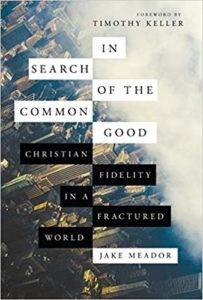 In Search of the Common Good: Christian Fidelity in a Fractured World by Jake Meador (IVP) $23.00
In Search of the Common Good: Christian Fidelity in a Fractured World by Jake Meador (IVP) $23.00
Meador tells a lot of stories about his own rustbelt sort of background, why he loves Wendell Berry and wants to reinvigorate our own ministries of place, and why both a high calling understanding of the vocation of work and a deeper commitment to the local church and Christian community may, in fact, help us heal the frayed and fracture body politic. Meador is super smart but writes so nicely, I could hardly put this down, even as he’s walking us through theories of Charles Taylor and why we have this angst in our secularizing culture and what sorts of virtues are needed to renew “the world outside our heads
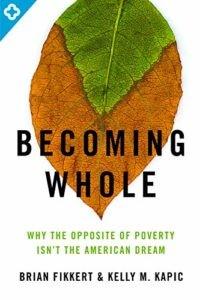 Becoming Whole: Why the Opposite of Poverty Isn’t the American Dream by Brian Fikkert & Kelly M. Kapic (Moody Press) $15.99
Becoming Whole: Why the Opposite of Poverty Isn’t the American Dream by Brian Fikkert & Kelly M. Kapic (Moody Press) $15.99
Here we read about worldviews and narratives and social imaginaries; it is a critique of the way in which too many church folks have allowed false stories such as the American Dream to shape our orienting principles, our own story. Yes, Becoming Whole is a prequel to the famous When Helping Hurts so it does get into anti-poverty ministries and alleviating brokenness from the lives of the marginalized. But it is more than a ‘social justice’ manifesto or a handbook for helping wisely. It is a grand vision of how to think about life from God’s perspective. What a clear-headed, helpful teaching tool it is for any of us tempted by the false hopes of the American dream, consumerism, individualism, autonomy, and self-actualization. There really is a better story.
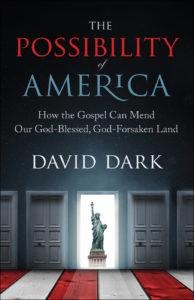 The Possibility of America: How the Gospel Can Mend Our God-Blessed, God-Forsaken Land by David Dark (WJK) $17.00
The Possibility of America: How the Gospel Can Mend Our God-Blessed, God-Forsaken Land by David Dark (WJK) $17.00
One of the most stimulating, thoughtful, remarkably-written, and provocative books I’ve read about the state of our times and the state of our union in these times. David is a lover of words, a lover of truth, a lover of what some call common grace – gladly thanking God for the signs of life that pop up in even a secularized culture, offered up even by those who seem not to be religious. David Dark has for many years been helping us understand how to understand the culture, how to see the good and the bad, the sacred and the profane. (Or, should I say, the sacred in the profane. And vice versa.) In a way, then, this new one about America is a continuation of that project, finding how deeply wise and transformative insights show up in the best of our American dreams, from our politics to our classic landscapes, our shaping documents to our best literature and song.
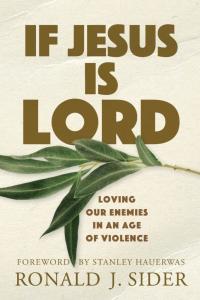 If Jesus is Lord: Loving Our Enemies in an Age of Violence by Ronald J. Sider (Baker Academic) $24.99
If Jesus is Lord: Loving Our Enemies in an Age of Violence by Ronald J. Sider (Baker Academic) $24.99
Sider, as you may know, was known for the seminal (and still in print and still very highly recommended) Rich Christians in an Age of Hunger. His evangelical bone fides are impeccable; his commitment to standard gospel theology and Christ-centered Bible reading is second to none. He loves church history, takes a fair-minded view of reading widely and listening to his critics, and believes in forging a vision where faith is decisive in people’s lives and behaviors because Jesus is Lord. As an Anabaptist—that faith tradition made up of the likes of Mennonites and Brethren—he believes in the local church as essential, and also simple living, service to others, and non-violence. Sider (now retired professor from Palmer Theological Seminary and founder of Evangelicals for Social Action) deserves our respect for his own efforts to be Biblically obedient, Christ-honoring, and ethically consistent. This is a finely written 240-page book, replete with footnotes and scholarly citations, making his comprehensive case for the Biblical call to evangelical nonviolence. It is the definitive work by Dr. Sider and certainly one of the great contributions to this topic in our lifetime.
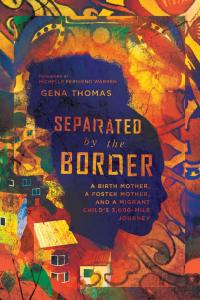 Separated by the Border: A Birth Mother, a Foster Mother, and a Migrant Child’s 3,000-Mile Journey by Gena Thomas (IVP) $16.00.
Separated by the Border: A Birth Mother, a Foster Mother, and a Migrant Child’s 3,000-Mile Journey by Gena Thomas (IVP) $16.00.
I cannot quite put my finger on all that moved me about this memoir. Perhaps it was because of the news that has been in the air while I was reading this—children in cages, children deported without parents and parents deported without their babies and on and on. The publisher saw the urgency of this narrative and wanted to put a human face on it all. This book, I believe, should be in every bookstore and library in the country as it is just so very, very timely. And as harrowing as it may be, it’s a great read, a moving tale, a stunning and audacious journey that shows, at least, as the publisher reminds us in the description, “the power of motherly love.”
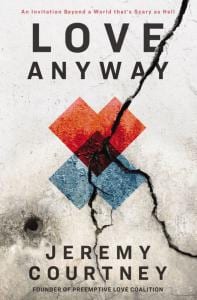 Love Anyway: A Journey from Hope to Despair and Back in a World That’s Scary as Hell by Jeremy Courtney (Thomas Nelson) $17.00.
Love Anyway: A Journey from Hope to Despair and Back in a World That’s Scary as Hell by Jeremy Courtney (Thomas Nelson) $17.00.
This was one of the most eagerly anticipated books for those of us who loved his stellar Preemptive Love about doing medical missions with children among Muslims, Jews and Christians in war-torn Iraq. Jeremy’s non-profit organization Preemptive Love does pediatric heart surgeries in Iraq which has the largest amount of children born with defective hearts anywhere in the world, most likely from the nuclear tipped, uranium-enhanced weapons the United States used in the first Gulf War. How did this Christian NGO helping the impoverished turn into a medical mission that drew in interfaith coalitions and became a cross-cultural project of reconciliation—dare I say, a post-9-11, Middle Eastern, anti-war movement – in this dangerous part of the world? Some of that is documented in Preemptive Love but the fuller backstory is now explained in riveting storytelling in Love Anyway. This is a harrowing story about Jeremy and his wife’s deepening their belief in the power of love and understanding and how this led them to different sorts of networks and ministries from Iraq to Syria. It gets hard, the writing is tense, the story powerfully told. It is one of the few books this year that I read straight through hardly without a break; what a page-turner!
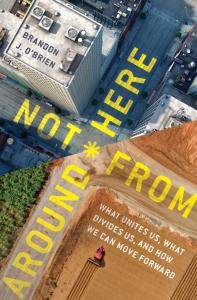 Not from Around Here: What Unites Us, What Divides Us, and How We Can Move Forward by Brandon J. O’Brien (Moody Publishers) $13.99.
Not from Around Here: What Unites Us, What Divides Us, and How We Can Move Forward by Brandon J. O’Brien (Moody Publishers) $13.99.
Brandon O’Brien is working with Tim Keller in New York City now, even though he has served small churches and wrote the quite useful Strategically Small Church. He co-authored the spectacular Misreading Scripture with Western Eyes: Removing Cultural Blinders to Better Understand the Bible and, in another curious bit of expertise, wrote in 2018 Demanding Liberty: An Untold Story of American Religious Freedom. Not from Around Here is a fun, easy-to-digest book that seems to combine these various interests of O’Brien: it is about the increasing divide in our polarized times between urban and rural worldviews. You know how this works–urban and seemingly sophisticated higher-brow people blame the rednecks, flyover country, the bumpkins. Those “deplorables” of the rural sort, despise the “elites.” Listen to what it says on the back cover. I love this: “News outlets, historians, and sociologists can (and do) tell us all about the statistics, but they don’t (and can’t) tell us about what it’s really like in a given place–how the squish of creek water between your toes or the crunch of autumn leaves on a city sidewalk shape your sense of normal and good and right. To understand that–to understand the people in the places–we need stories. We need to listen, get to know the nuance of people, and have empathy for their way of seeing things.”
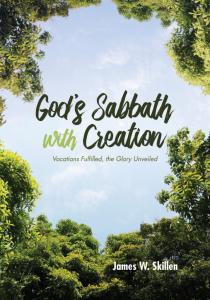 God’s Sabbath With Creation: Vocations Fulfilled, the Glory Unveiled James Skillen (Wipf & Stock) $35.00.
God’s Sabbath With Creation: Vocations Fulfilled, the Glory Unveiled James Skillen (Wipf & Stock) $35.00.
Skillen often works in the higher scholarly levels of political philosophy and is respected in a circle of political thinkers in the line of the Dutch Christian statesman Abraham Kuyper (and even more specifically, among those who studied legal theory or social philosophy in the tradition of Dutch philosopher Herman Dooyeweerd, like, say, David Koyzis, Jonathan Chaplin, Paul Marshall, John Witte, Elaine Botha, Bob Goudzwaard, James K.A. Smith, Stanely Carlson-Thies, Robert and Jessica Joustra, Matthew Kaemingk, Richard Mouw, and even Nicholas Wolterstorff). When Skillen offers this first major collection of writings since his retirement from CPJ, Christians interested in redeeming the vocation of citizenship and politics amidst the clanging gongs of the religious right and the Christian left, we should listen. But, know this: God’s Sabbath for Creation showcases Jim’s love for Scripture and his deep awareness of important themes in the Bible. God’s Sabbath for Creation has intriguing chapters, rich Biblical insights, new ideas, wild dreams, good hopes rooted in the Bible’s own story and its description of the creation’s purposes and the fulfillment of those purposes. It is one of the unsung books of the year by one of the unsung heroes of our time.
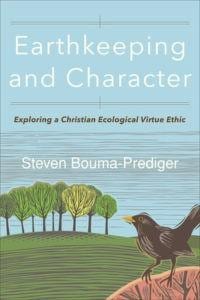 Earthkeeping and Character: Exploring a Christian Ecological Virtue Ethic by Steven Bouma-Prediger (Baker Academic) $24.99
Earthkeeping and Character: Exploring a Christian Ecological Virtue Ethic by Steven Bouma-Prediger (Baker Academic) $24.99
Bouma-Prediger is a serious philosopher and a fully engaged cultural activist and a beloved, inspiring teacher with a gift of being a great communicator. He’s not an armchair philosopher or ivory tower thinker; deep as he may be, Bouma-Prediger does his ecological thinking fully immersed in the outdoors (and, it seems, in communion with a broader community of scholars, writers, activists and students.) The stories of taking students camping or backpacking or on ecological field tips make the book really come alive. Bouma-Prediger’s For the Beauty of the Earth remains a standard text, if not the gold standard; I hope you know it. But his new Earthkeeping and Character is fantastic, not least because it brings new stuff into the conversation; it is, in a sense pioneering. This question of character formation—what kind of people must we be if we are going to care well for the planet God so loves? – is essential. It may be one of the biggest questions of our time.
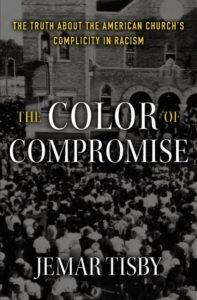 The Color of Compromise: The Truth about the American Church’s Complicity in Racism Jemar Tisby (Zondervan) $21.99
The Color of Compromise: The Truth about the American Church’s Complicity in Racism Jemar Tisby (Zondervan) $21.99
Jemar Tisby is a young African American who has studied at Reformed Theological Seminary and is working on his PhD in history. He lives in Jackson, Mississippi, and brings a deep commitment to social justice and an obvious awareness of the African American experience to his passionate writing. But yet, this isn’t only a call for the church to repent of its complicity in fostering white supremacy and racial injustices, not only a call to be more intentional about learning about race and white privilege and so forth, but it is, in fact, a history of the church’s complicated role in racism in the US. It helpfully starts in the Colonial Era and moves into all the important periods, including the question of Christian slave owners, moves to the abolition efforts and then the Antebellum Period after the Civil War, the rise of Jim Crow and so on. It is lively and well written and even though this is harsh stuff, it is the best overview of this material I think I have ever read.
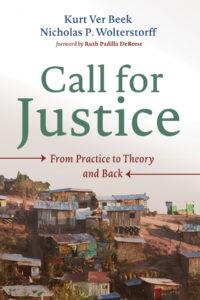 Call for Justice: From Practice to Theory and Back by Kurt Ver Beek & Nicholas P. Wolterstorff (Cascade) $26.00
Call for Justice: From Practice to Theory and Back by Kurt Ver Beek & Nicholas P. Wolterstorff (Cascade) $26.00
Years ago, Kurt Ver Beek, Jo Ann Van Engen, and some other professors and friends from Calvin College (now University) started doing service trips to Central America. They wrote a widely distributed, republished, and debated critique of the value of “short term missions trips” and, to flesh out their own sense of working with locals. As these new Honduran friends worked for fair wages, land reform, police protection, local voting rights, and other such basic human rights, they came under persecutions, the sort that are fairly typical among the right-wing despots supported by US military aid in Central America. It became clear that perhaps the most urgent matter was not having youth come to do well-intended simple work projects but, rather, to find ways to accompany these local citizens in their efforts for justice for all. There needed to be organizational and institutional heft to their cries for the rule of law. Ver Beek (who is still a Professor of Sociology at Calvin) and his wife Van Engen created a “Justice Semester” in Honduras for Christian college students. Soon, they helped form the Asociacion para una Sociedad mas Justa — a Honduran NGO “made up of individuals seeking to be brave Christians making the Honduran government work, especially for those most vulnerable” and, then, a US-based non-profit support group, Association for a More Just Society (ASJ). Eventually, Ver Beek and Van Engen convinced their friend and supporter, widely respected Christian philosopher and outspoken justice advocate Nicholas Wolterstorff to join them in Honduras to observe their work. Ver Beek and Wolterstorff committed to doing a serious set of letter exchanges back and forth, discussing different aspects of public life, faith-based social change, justice advocacy, and particularly the on-the-ground stories of the efforts of ASJ. The flow and structure of the book sees Nick adding what he could from his vantage point as a philosopher of justice (he has written deep and scholarly works on political philosophy and on the nature and attributes of justice) and Ver Beek answering with more practical replies. Or, sometimes, it would go the other way: Ver Beek would start with a specific and concrete detail of their advocacy work and invite Wolterstorff to ruminate on the deeper theological or political implications of it all. Through it all – amidst tender asides and honest notes from obviously two good and Godly friends – there is this “theory to practice” and “practice informed by theory” vibe to all their epistles.
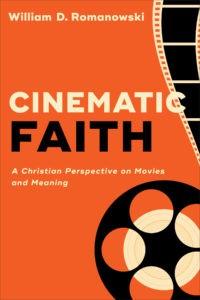 Cinematic Faith: A Christian Perspective on Movies and Meaning by William D. Romanowski (Baker Academic) $22.99
Cinematic Faith: A Christian Perspective on Movies and Meaning by William D. Romanowski (Baker Academic) $22.99
This book sets out to do things that few books in the ever-growing genre of faith and film books do; namely, to study film (Christianly, to be sure) as artwork. Study film as a work of art? Of course; there is an art and craft to film making, and just as a critic of paintings or dance or photography or sculpting. Romanowski bucks the trend of merely critiquing the plot and message of a movie, as if the moral of the show is all that matters. Cinematic Faith is inviting us all to enjoy movies more, as believers, before God, certainly by being attentive to the story and meaning and morals of the film, but more foundationally, by knowing something about how movies are made. What is cinematography and how does it work to create a mood or aesthetic and tone, and how is that mood or aesthetic or tone shaped by the deepest instincts or worldview of the cinematographer? What does the director do? What about editing? How does the acting help tell the story — in fact, why did the casting director choose the stars that he or she did? And on we go, deep into the curious facts and features and finances of the complex art of making a movie, exploring what Romanowski says are film’s “unique capabilities as an audiovisual medium.”
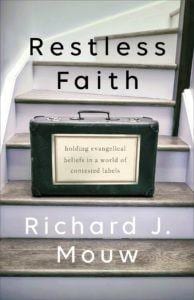 Restless Faith: Holding Evangelical Beliefs in a World of Contested Labels by Richard Mouw (Brazos) $19.99
Restless Faith: Holding Evangelical Beliefs in a World of Contested Labels by Richard Mouw (Brazos) $19.99
Dr. Mouw is absolutely my favorite theologian and this is his reasonable, chatty, conversation about what it means to be an evangelical, how he, as an ecumenically-sensitive, Reformed thinker, uses that word to describe himself (even though he’s never been fully comfortable with the association) and why he thinks it is still worth holding on to. I am amazed how Mouw can take a story or episode or a book, calmly tell you something about it, use it as a springboard for another idea which he counters with a critique of that idea, smoothly helping us understand several viewpoints on a topic and why he favors this or that nuanced formulations. It is just wonderful being guided by him towards better thinking and a true joy of learning.
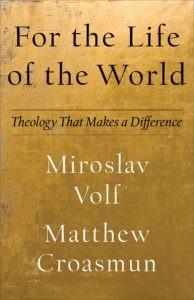 For the Life of the World: Theology That Makes a Difference by Miroslav Volf & Matthew Croasmun (Brazos Press) $21.99
For the Life of the World: Theology That Makes a Difference by Miroslav Volf & Matthew Croasmun (Brazos Press) $21.99
Not all of us can wade through heady, abstract theology, and this book deserves our accolades here at year’s end because it was a book that, in fact, tried to address that. Not that they suggest all academic theology should just be less scholarly. No, they are asking a more fundamental question, it seems: what is the point of theology if it does not make a difference in help us, as individuals, churches, and society at large? That is, does theology bring about shalom? Does it make us flourish? There are bold and some may protest, but they are asking if theology can actually address the actual question of what makes for human happiness. This work is asking a huge question, and that is, if it doesn’t sound too grand, “what makes life worth living?”
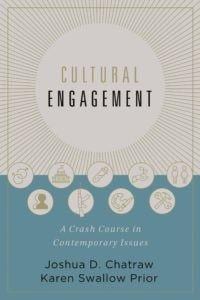 Cultural Engagement: A Crash Course in Contemporary Issues by Joshua Chatraw & Karen Swallow Prior (Zondervan) $29.99
Cultural Engagement: A Crash Course in Contemporary Issues by Joshua Chatraw & Karen Swallow Prior (Zondervan) $29.99
I am not always confident that these books that have a dozen different topics in them are that useful. The viewpoints may be shallow or overly biased in one or the other directions and the topics covered may or may not be the most timely. Happily, Cultural Engagement gets is pretty right on both scores. First, there are several viewpoints offered in each section of this anthology and while all the authors seem to be orthodox believers committed to evangelical faith, the views are delightfully and helpfully diverse. There are fine scholars here, writing to a mostly conservative readership, but they cover a variety of viewpoints and take into consideration various nuances. Some of the writers include Andy Crouch and Joel Salatin, Robert George and Tish Harrison Warren, Katelyn Beaty and Vincent Bacote, Makoto Fujimura and Ben Witherington. The topics are all germane and urgent. From socially contested topics such as creation care, human life and reproductive technologies, immigration, gender roles, war animal welfare, and capital punishment, there are more general topics as well — thinking about a Christian view of work, for instance, and good stuff on the arts, and the posture we take regarding civic life.
BIBLICAL STUDIES
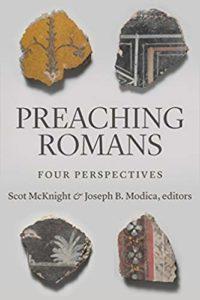 There has been quite an interest in Pauline studies this year, and we’re excited. One important and interesting one is Preaching Romans: Four Perspectives edited by Scot McKnight & Joseph Modica (Eerdmans; $20.00.) It offers four different “takes” or approaches to the famous epistle and then suggests how preachers should proclaim the message of Romans. There are not only essays about the four different approaches but also sample sermons. Some of the esteemed scholars and preachers who are included in this good resource are Michael Gorman, Fleming Rutledge, Michael Bird, Douglas Campbell, Richard Hays, Tara Beth Leach, William Willimon, and others, all indicative of one of the four interpretive perspectives.
There has been quite an interest in Pauline studies this year, and we’re excited. One important and interesting one is Preaching Romans: Four Perspectives edited by Scot McKnight & Joseph Modica (Eerdmans; $20.00.) It offers four different “takes” or approaches to the famous epistle and then suggests how preachers should proclaim the message of Romans. There are not only essays about the four different approaches but also sample sermons. Some of the esteemed scholars and preachers who are included in this good resource are Michael Gorman, Fleming Rutledge, Michael Bird, Douglas Campbell, Richard Hays, Tara Beth Leach, William Willimon, and others, all indicative of one of the four interpretive perspectives.
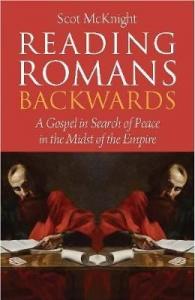 Later in the year, Scot McKnight himself did a freshly conceived but careful commentary on Romans entitled Reading Romans Backwards: A Gospel of Peace in the Midst of Empire (Baylor University Press; $29.99 — no discount available on this one; sorry.) It, of course, emphasizes the ecclesiological context and implications.
Later in the year, Scot McKnight himself did a freshly conceived but careful commentary on Romans entitled Reading Romans Backwards: A Gospel of Peace in the Midst of Empire (Baylor University Press; $29.99 — no discount available on this one; sorry.) It, of course, emphasizes the ecclesiological context and implications.
Scot McKnight has been quite busy. He also has been editing Zondervan’s useful Story of God Bible Commentaries (along with Tremper Longman). Past volumes include standout commentaries by Tremper Longman on Genesis, Scot McKnight on The Sermon on the Mount, Mark Bird on Romans, and Mark Roberts on Ephesians. In 2019, two new volumes were released–Joshua by Lissa Wray Beal and Acts by Dean Pinter.
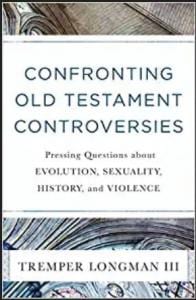 Tremper Longman released a major work to through his hat into the ring of the genre of books that help us understand the hard and complicated stuff of the Bible in his Confronting Old Testament Controversies: Pressing Questions about Evolution, Sexuality, History, and Violence (IVP; $19.99.) He is as trustworthy as they come so this deserves attention and appreciation.
Tremper Longman released a major work to through his hat into the ring of the genre of books that help us understand the hard and complicated stuff of the Bible in his Confronting Old Testament Controversies: Pressing Questions about Evolution, Sexuality, History, and Violence (IVP; $19.99.) He is as trustworthy as they come so this deserves attention and appreciation.
Zondervan made a real mark in 2019 as they released two different video curriculums by N.T. Wright and Michael Bird and a major, major textbook. This is amazing — what riches we have to use among our churches and small groups and Bible studies and fellowship groups. First, last winter, there was the upbeat and fabulous “live from the Holy land” 8-session DVD The New 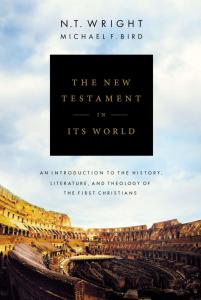 Testament You Never Knew Video Study: Exploring the Context, Purpose, and Meaning of the Story of God ($39.99, or $51.99 for a DVD/Participant’s Guide combo package.) It’s perfect for almost any group that wants solid teaching that is accessible and clear. Then, in the fall, they released Wright and Bird’s massive (992 page) text The New Testament in Its World: An Introduction to the History, Literature, and Theology of the First Christians (Zondervan Academic; $59.99) that surely deserves the acclaim it has been getting. It is superb, perhaps the best volume of its kind! There is a large companion workbook, too, The New Testament in Its World Workbook ($22.99), that we have to go through this big text which is useful as a study resource. The matching DVD set of The New Testament in Its World Video Lectures offers 37-lesson seminary-level video lectures and shows Wright and Bird as good professors not just in the classroom but, again, live in the holy land. As you can imagine, given how lovely and helpful actually hearing N.T. Wright is (and Bird is pretty great as a speaker, too) this hefty set of lectures is highly recommended for those wanting a deeper study.
Testament You Never Knew Video Study: Exploring the Context, Purpose, and Meaning of the Story of God ($39.99, or $51.99 for a DVD/Participant’s Guide combo package.) It’s perfect for almost any group that wants solid teaching that is accessible and clear. Then, in the fall, they released Wright and Bird’s massive (992 page) text The New Testament in Its World: An Introduction to the History, Literature, and Theology of the First Christians (Zondervan Academic; $59.99) that surely deserves the acclaim it has been getting. It is superb, perhaps the best volume of its kind! There is a large companion workbook, too, The New Testament in Its World Workbook ($22.99), that we have to go through this big text which is useful as a study resource. The matching DVD set of The New Testament in Its World Video Lectures offers 37-lesson seminary-level video lectures and shows Wright and Bird as good professors not just in the classroom but, again, live in the holy land. As you can imagine, given how lovely and helpful actually hearing N.T. Wright is (and Bird is pretty great as a speaker, too) this hefty set of lectures is highly recommended for those wanting a deeper study.
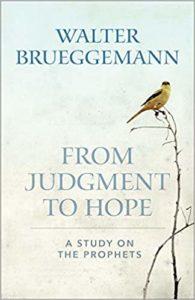 We are excited about three new Walter Brueggemann books written for a popular audience. First, there is the short but delightfully useful From Judgment to Hope: A Study on the Prophets (WJK; $14.00) which I highly recommend. Also released in October was An On-going Imagination: A Conversation About Scripture, Faith, and the Thickness of Relationships (WJK; $18.00.) It is a fabulous transcript of the honest conversations between Clover Beal and Walt over a period of months together. Something that delighted many with joy and surprise was A Glad Obedience: Why and What We Sing (WJK; $18.00.) It includes a number of studies on the role of music and hymns in our lives by way of studying a handful of typically mainline Protestant hymns, followed by a handful of chapters studying various Psalms that were firstly sung.
We are excited about three new Walter Brueggemann books written for a popular audience. First, there is the short but delightfully useful From Judgment to Hope: A Study on the Prophets (WJK; $14.00) which I highly recommend. Also released in October was An On-going Imagination: A Conversation About Scripture, Faith, and the Thickness of Relationships (WJK; $18.00.) It is a fabulous transcript of the honest conversations between Clover Beal and Walt over a period of months together. Something that delighted many with joy and surprise was A Glad Obedience: Why and What We Sing (WJK; $18.00.) It includes a number of studies on the role of music and hymns in our lives by way of studying a handful of typically mainline Protestant hymns, followed by a handful of chapters studying various Psalms that were firstly sung.
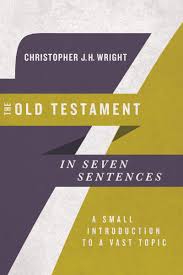
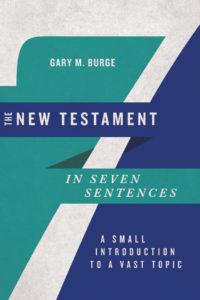 I adored The Old Testament in Seven Sentences: A Small Introduction to a Vast Topic by the impeccable Christopher J.H. Wright (IVP Academic; $16.00) and The New Testament in Seven Sentences: A Small Introduction to a Vast Topic by the very astute Wheaton prof, Gary M Burge (IVP Academic; $16.00). As always, InterVarsity Press has this knack to create good books that are thoughtful and informed without being overly academic. They do lots of books for the “thoughtful layperson” alongside their extraordinary scholarly imprint. IVP Academic. (These two are, by the way, in their “IVP Academic” imprint which I guess they suppose will allow them be adopted as college-level introductory texts. I suppose, but they aren’t nearly as scholarly as many in that academic imprint, so don’t let that scare you away. These make great books for any reader.
I adored The Old Testament in Seven Sentences: A Small Introduction to a Vast Topic by the impeccable Christopher J.H. Wright (IVP Academic; $16.00) and The New Testament in Seven Sentences: A Small Introduction to a Vast Topic by the very astute Wheaton prof, Gary M Burge (IVP Academic; $16.00). As always, InterVarsity Press has this knack to create good books that are thoughtful and informed without being overly academic. They do lots of books for the “thoughtful layperson” alongside their extraordinary scholarly imprint. IVP Academic. (These two are, by the way, in their “IVP Academic” imprint which I guess they suppose will allow them be adopted as college-level introductory texts. I suppose, but they aren’t nearly as scholarly as many in that academic imprint, so don’t let that scare you away. These make great books for any reader.
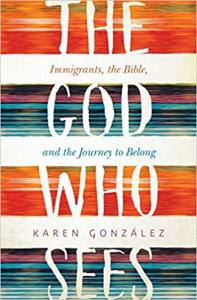 The God Who Sees: Immigrants, the Bible, and the Journey to Belong by Karen Gonzalez (Herald Press) $16.99.
The God Who Sees: Immigrants, the Bible, and the Journey to Belong by Karen Gonzalez (Herald Press) $16.99.
There is, as many of us have come to realize in recent decades, a lot in the Bible about how to be welcoming to strangers and to have gracious policies about immigrants. And there are narratives of refugees and those who are our “intrepid heroes of the faith who cross borders and seek refuge.” Kudos to Herald Press for doing these fine kinds of books that are a bit genre-bending but ultimately very, very helpful. Good Scripture study and inspiring Biblical reflection should be mixed with real-life narrative and should lead to real-life social change. Karen Gonzalez is one of the few Christian writers about immigration issues who herself if an immigrant, and yes, she tells a lot of her poignant story, making this a heckuva a great read. But alongside the personal narrative and the natural advocacy, there is, at the heart of the book, a study of characters in Scripture who have fled their homelands. Seen through the lens of migration, Ms. Gonzalez studies Hagar and Joseph, Ruth and, yes, Jesus.
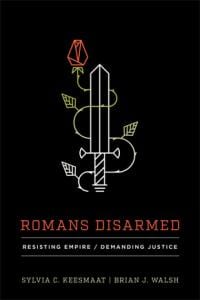 Romans Disarmed: Doing Justice/Resisting Empire by Sylvia Keesmaat & Brian Walsh (Brazos Press) $26.99.
Romans Disarmed: Doing Justice/Resisting Empire by Sylvia Keesmaat & Brian Walsh (Brazos Press) $26.99.
I think this is was my very favorite nonfiction read of 2019; certainly it was the most provocative and intellectually stimulating. Their explanations of first-century Roman life and how Paul’s pastoral letter would have been received and discussed and applied is spectacular. Their storytelling puts you into the culture of the day and even if it is a bit speculative (despite pages of studious footnotes) it makes the old book come alive. Their insistence that we strip the layers of accrued theological jargon from the letter and allow it to call us today into a Romans-like faith community that brought together rich and poor, the sexually conventional and those less so, slavers and those trafficked, Jews and Gentiles, is stunningly powerful, unlocking a revolutionary sort of application that is truly transformational.
SPECIAL
DISCOUNT
20% OFF
ANY BOOK LISTED HERE
(see below)
SPIRITUALITY
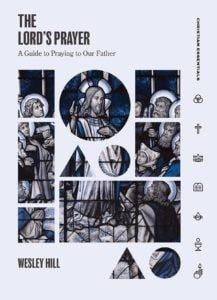 The Lord’s Prayer: A Guide to the Our Father by Wesley Hill (Lexham Press) $15.99
The Lord’s Prayer: A Guide to the Our Father by Wesley Hill (Lexham Press) $15.99
This is a marvelous read, spiritually edifying, good for those who are just beginning to study the topic of prayer and good for those who want a brief but lucid theological account of the famous passage in Matthew now called “The Lord’s Prayer” or “The Our Father.” Hill is a deep scholar (with a PhD from the University of Durham) and a New Testament professor at Trinity School for Ministry, but he wears his academic insights lightly. It is evident, I think, that he has done serious work on Trinitarian theology (not every book on the Lord’s Pray is so significantly Trinitarian). He is aware of the recent longings for community among younger adults, especially, and is committed to a Biblically-driven passion for social justice; these come out in the text in lovely, helpful ways, making me all the more eager to promote this fabulous study. Another nice touch in this book is its design: it is a slim, compact-sized hardback without a dust-jacket with artful graphic design touches and reverse-color ink and classic art.
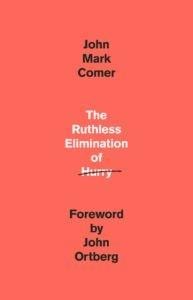 The Ruthless Elimination of Hurry by John Mark Comer (Waterbrook) $23.99
The Ruthless Elimination of Hurry by John Mark Comer (Waterbrook) $23.99
This book is fun and cool, the design is hip and youthful, but the content is perennial, good for anyone who wants to deepen their spiritual lives by slowing down, learning to be mindful, and creating transforming space to know God more intimately, so to be remade into the image of Christ. John Ortberg (who has served as a bit of a mentor to John Mark Comer and wrote a great forward to The Ruthless Elimination of Hurry) has told how when asking Dallas Willard for advice about his spiritual life, Willard told him to (ruthlessly) cut out his addiction to hurry. Ortberg asked, “What else?” After a pause, the answer was blunt: There was nothing else. Comer takes seriously this advice and provides an amazing book. He is perhaps best known for his book Garden City: Work, Rest, and the Art of Being Human. His books are punchy, with short paragraphs, a few pages of reverse black/white printing, lots of white margin, sleek, simple fonts, with no fussy, old-fashioned dust jacket. The Ruthless Elimination of Hurry seems to be written for those in a hurry, which perhaps is as it should be. Not everybody can wade through Willard’s dense and thick Divine Conspiracy. Comer knows what Ortberg and Willard knows: we eliminate hurry because it is dangerous, bad for our hearts and for our souls. And this is the key to Comer’s invitation: we are invited to take the easy yoke of Jesus our Rabbi/Teacher and learn his ways. We don’t just slow down a bit to regain our health, catch our breath. We slow down because it is the way of Jesus and we are to be like Him.
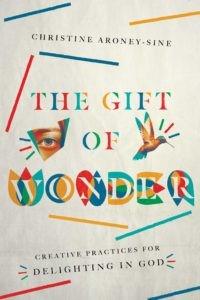 The Gift of Wonder: Creative Practices for Delighting in God by Christine Aroney-Sine (IVP) $16.00
The Gift of Wonder: Creative Practices for Delighting in God by Christine Aroney-Sine (IVP) $16.00
Together, Christine and Tom Sine have forged an innovative life of service, justice, community, and celebration. What a great book this is. Christine offers very special practices, ideas, proposal and guides for doing all kinds of creative activities to heighten our sense of the sacred, to learn to stand in awe, to deepen our wonder. She invites us to play — like a child! Christine is so attuned to the beauty of creation and the way God can speak to us through its speech (think of Psalm 19) she seems a proponent of something akin to a Celtic sort of spirituality (which maybe she learned in her native Australia, who knows?) She sees God’s handiwork all over and helps us lean into an appreciation for a sense of the sacred — and responds even with the occasional poem of doxology. Can we enjoy our faith, enjoy our days, celebrate the goodness (even as we hunger for greater hope and justice?) This book will be a life-giving aid to anyone who takes it up and you can spend years practicing the many suggestions and ideas she puts on offer.
FAVORITE MEMOIRS
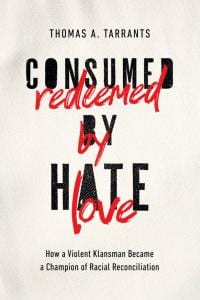 Consumed by Hate, Redeemed by Love: How a Violent Klansman Became a Champion of Racial Reconciliation by Thomas A. Tarrants (Thomas Nelson) $24.99.
Consumed by Hate, Redeemed by Love: How a Violent Klansman Became a Champion of Racial Reconciliation by Thomas A. Tarrants (Thomas Nelson) $24.99.
Consumed by Hate tells about Tom’s evil involvement, in the 1960s, with the KKK and worse. He went to jail for terrorism as he attempted to bomb the home of Jewish folks; his partner in crime died in the police shootout and he himself was very seriously wounded. The backstory of his ideological commitments—what today we might call the alt-right—is told plainly and one is still left pondering how someone gets so radicalized. Still the story moves on and the following chapters are even more dramatic! Tarrants remarkably escaped from prison and was later apprehended (he was on the infamous FBI “Most Wanted” list). While in prison (again) he became, slowly but surely, a transformed man, converted by Christ to the ways of the Lord Jesus. This is amazing stuff about amazing grace and left me in tears. Through Prison Fellowship and other strategic leaders investing in him as a growing Christian prisoner, he was miraculously pardoned by the governor of the state and eventually released. Tom continued to study and minister to others as he took up the call to Christian ministry – co-pastoring a bi-racial, urban church, no less! Years later, the well-educated and utterly transformed Tarrants became the director of the C.S. Lewis Institute in Washington DC. My bare-bones outline doesn’t do justice to the suspense and power of this remarkable story. When authors as gifted as John Grisham rave about it, as he has, you know it’s good.
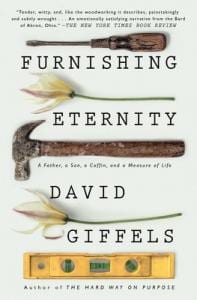 Furnishing Eternity: A Father, a Son, a Coffin, and a Measure of Life David Giffels (Scribner) $16.00.
Furnishing Eternity: A Father, a Son, a Coffin, and a Measure of Life David Giffels (Scribner) $16.00.
I’m listing this as a 2019 release because it came out in paperback this year. I must say this is one of my favorite memoirs ever! The author was a young, edgy English teacher at a community college in Akron, Ohio and is also quite the diligent word-worker, inspired and apprenticed by his dad, a truly excellent craftsman (Bob Robinson remembers reading his work in Akron’s newspaper). As he is grieving the loss of his mother and the loss of a good friend, Giffels decided to build a coffin with and for his dad. This is the story of that year making that coffin. It sounds a bit morbid, but it isn’t. The two are close, the family is extended, the poignant and wacky episodes are funny and sad and includes some rock and roll, and a lot of wood and sawdust. It is clever and whimsical and poignant and, indeed, about life and death, loss and love.
FOR CHURCHES AND PASTORS
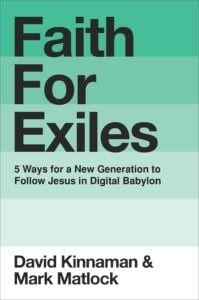 Faith for Exiles: 5 Ways for a New Generation to Follow Jesus in Digital Babylon by David Kinnaman & Mark Matlock (Baker) $21.99
Faith for Exiles: 5 Ways for a New Generation to Follow Jesus in Digital Babylon by David Kinnaman & Mark Matlock (Baker) $21.99
This is for anyone who is interested in retaining the young adults at their church – and who isn’t? – and is an exceptionally interesting, clear, and helpful resource. It offers an overview of the extensive research and evaluation Kinnaman’s organization (The Barna Group) has done on what keeps young adults from saying “you lost me” (as in Kinnaman’s 2011 must-read book that explored what goes wrong in young adult ministry, You Lost Me.) This new one shows what we might do right – five things needed to keep younger folks vibrant in faith and interested in your church.
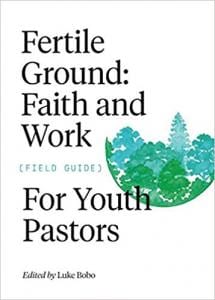 Fertile Ground: Faith and Work (Field Guide) for Youth Pastors edited by Luke Bobo (Made To Flourish) $7.99
Fertile Ground: Faith and Work (Field Guide) for Youth Pastors edited by Luke Bobo (Made To Flourish) $7.99
This very small book is handsome and nicely made, a collection of five key chapters that help youth workers develop among their kids a robust and faithful foundation for thinking Christianly about culture, calling, work, and careers. There has been precious few resources to wisely help youth take up this vision and hardly anything of book length to equip youth workers to talk to teens about all this. Luke Bobo has developed curriculum and resources through the wonderful Made to Flourish network. This is foundational stuff, drawing on Tom Nelson and broader worldview writers (Al Wolters, Richard Mouw, James K.A. Smith) helping youth workers develop a cultural theology, create formative liturgical practices to shape young imaginations, and offering a reintegrated vision of the meaning of labor, the discernment of call, and the vision of social transformation.
MISSIOLOGY AND MISSIONS
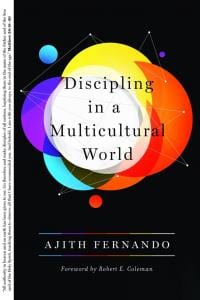 Discipling in a Multicultural World by Ajith Fernando (Crossway) $19.99.
Discipling in a Multicultural World by Ajith Fernando (Crossway) $19.99.
Fernando insists that our multicultural world needs countercultural disciplers. Hmmm. Let that sink in. That we are to “make disciples” suggests that some of us, at least, should be learning how to “disciple” others into the ways of Christ-honoring discipleship. And so, if this is true—and it obviously is—how does this “discipling” happen in the ever-more-common cross-cultural situations? Global missionaries have to think about this and missiologists are endlessly hoping to find the answer to a fruitful “contextualized” way to relate Christ and culture. But anyone in almost any town in North America now must take up this discussion. We all must wonder how to be sensitive to cultural and ethnic concerns as we make disciples. Ajith Fernando’s how we do discipleship in contexts such as among those from cultures that are oriented around honor and shame; what about honoring family commitments, if the family is of another religion (or no religion)? What about dealing with persecution? Some of these stories may be set in South Asia, but you will learn much from them and it just may keep you from harming those from other cultures you are befriending even now.
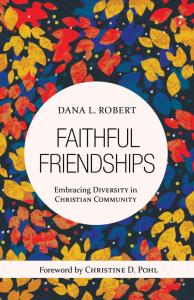 Faithful Friendships: Embracing Diversity in Christian Community by Dana Robert (Eerdmans) $19.00.
Faithful Friendships: Embracing Diversity in Christian Community by Dana Robert (Eerdmans) $19.00.
We don’t know whether to put this book under our section about racism and multi-ethnic ministry because it is about cross-cultural diversity. But it is also about diversity within the church, so we surely should shelf it in our section about community, next to ecclesiology. But, you know what? It also is a book, as Pohl reminds us, about friendship. So it goes under friendship, over in the self-help sort of personal growth section. This book is deeply Christian, rooted in the gospels, and yet is full of contemporary stories, examples and illustrations of lasting friendships and cross-cultural initiatives.
A BOOK I MUST AWARD – BUT IN WHAT CATEGORY?
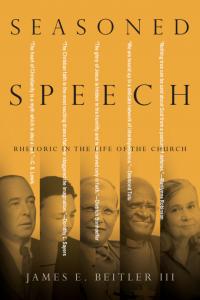 Seasoned Speech: Rhetoric in the Life of the Church James E. Beitler (IVP Academic) $25.00 Okay, I’ve already said that I don’t know what to do with this amazingly interesting, brilliantly conceived, one-of-a-kind book. Kudos to IVP for bringing such stimulating and thoughtful books to us, even if, as I suspect, many stores just won’t carry it. I hope that is not the case, as this book deserves to be widely read, seriously considered, discussed and somehow applied. Rhetoric—how do we “speak the truth in love” as the Bible commands? How do we speak in a way that is relevant and timely and gracious and clear and profound and good and stimulating and… well, you get the picture. How we speak, persuade, honor the image of God in others, denounce evil and highlight beauty and goodness – whether we are in ordinary, everyday conversations or whether we are novelists or essayists, bloggers or preachers, we simply have to think harder about how to learn to be wise and compelling. The title of the book draws from Colossians 4:6 where Paul wrote “Let your speech always be gracious, seasoned with salt, so that you may know how you ought to answer everyone.” As you perhaps can see from the cover, what this author is doing in this grand and thoughtful work, is exploring different (faithful) rhetorical styles as evidenced by several different public intellectuals, faithful Christians who have made their mark before the watching world: C.S. Lewis, Dorothy Sayers, Dietrich Bonhoeffer, Desmond Tutu, and Marilyn Robinson. What a great idea for a book, and what a splendid array of thinkers, writers, and communicators to help us grapple with how to have seasoned speech in different complicated settings.
Seasoned Speech: Rhetoric in the Life of the Church James E. Beitler (IVP Academic) $25.00 Okay, I’ve already said that I don’t know what to do with this amazingly interesting, brilliantly conceived, one-of-a-kind book. Kudos to IVP for bringing such stimulating and thoughtful books to us, even if, as I suspect, many stores just won’t carry it. I hope that is not the case, as this book deserves to be widely read, seriously considered, discussed and somehow applied. Rhetoric—how do we “speak the truth in love” as the Bible commands? How do we speak in a way that is relevant and timely and gracious and clear and profound and good and stimulating and… well, you get the picture. How we speak, persuade, honor the image of God in others, denounce evil and highlight beauty and goodness – whether we are in ordinary, everyday conversations or whether we are novelists or essayists, bloggers or preachers, we simply have to think harder about how to learn to be wise and compelling. The title of the book draws from Colossians 4:6 where Paul wrote “Let your speech always be gracious, seasoned with salt, so that you may know how you ought to answer everyone.” As you perhaps can see from the cover, what this author is doing in this grand and thoughtful work, is exploring different (faithful) rhetorical styles as evidenced by several different public intellectuals, faithful Christians who have made their mark before the watching world: C.S. Lewis, Dorothy Sayers, Dietrich Bonhoeffer, Desmond Tutu, and Marilyn Robinson. What a great idea for a book, and what a splendid array of thinkers, writers, and communicators to help us grapple with how to have seasoned speech in different complicated settings.
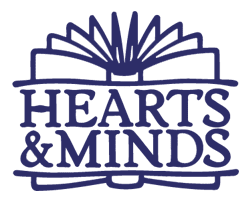
SPECIAL
DISCOUNT
20% OFF
ANY BOOK LISTED HERE
MENTION “REINTEGRATE”
+++
this takes you to the secure Hearts & Minds order form page
just tell us what you want
if you have questions or need more information
just ask us what you want to know
Hearts & Minds 234 East Main Street Dallastown PA 17313
[email protected]
717-246-3333
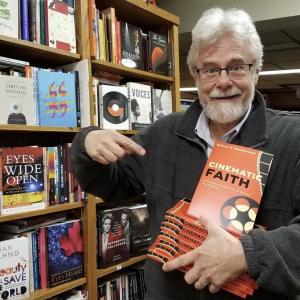
Byron Borger, along with his wife Beth, owns and operates Hearts & Minds, an independent Christian bookstore in Dallastown, PA (near York, PA) which they have run for 34 years. Before opening their bookstore, they worked in campus ministry for the CCO (Coalition for Christian Outreach) in Pittsburgh, PA and served as an associate director of the Thomas Merton Center in Pittsburgh. Byron graduated from Indiana University of Pennsylvania with an MA in speech pathology and later earned a Masters in Higher Education at Geneva College. He was recently awarded an honorary doctorate from Geneva College.
Their ecumenical bookstore serves a wide variety of church groups, and others, and emphasizes resources which illustrate the integration of faith and learning, serving a robust vision of vocation, calling, and serving God in the workaday world and encouraging social action for cultural renewal. He speaks widely about the transforming consequences of the gospel for all of life and has lead workshops on reading, applied theology, cultural engagement, and social justice at national events such as Redeemer Presbyterian Church’s Center for Faith & Work in New York, Mako Fujimura’s IAM arts gatherings, Bread for the World anti-hunger conferences, the Q ideas event, and CCO’s college student conference, Jubilee. He has spoken at many Christian colleges, including Gordon, Eastern, Messiah, Montreat, Houghton, and others. He offers off-site book displays at many denominational gatherings, clergy retreats, and church revitalization conferences. Byron has written for various publications, including, Q Ideas, Comment, and the Center for Public Justice’s Capitol Commentary. Even though committed to the old-school printed page, he enjoys using social media and blogs regularly about books in their weekly blog newsletter, BookNotes. He is the editor of a book for college graduates called Serious Dreams: Bold Ideas for the Rest of Your Life.
Byron and Beth have three grown children and are active at First Presbyterian Church, York, Pennsylvania.
Feature Image by John Loo. Used with permission. Sourced via Flickr.




